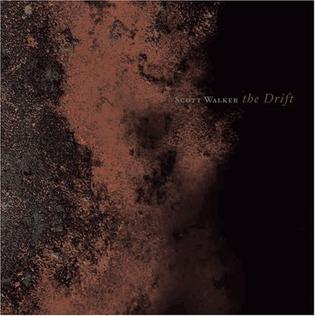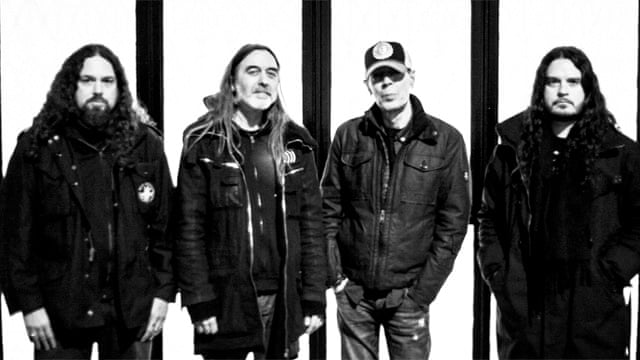I thought I'd attempt something quite extensive and detailed for this post, I hope it reads well and doesn't get to ranty or pretentious. I really consider Scott Walker an artist in the truest sense and hope that you agree with what I've written, and if not please argue with me!
--
Dance music for the manically depressed. Meditation for the schizophrenic. From a rich and warm world of musical fame to a sparse and oppressive wasteland; Walker's music is that of the fallout, the human mind collapsed in on itself, the weight of its own flawed consciousness seeping into a desolate insanity. Walker's musical world is jarring and oppressive, and the change in his personal world - from idolized world famous pop star to experimental musical genius (in my opinion) - is just as striking.
Scott Walker, it seems, has always been unconcerned with the
trappings of money and fame; in fact, from his days in the world-famous The Walker
Brothers he came across as aloof and disinterested. There is one
black-and-white clip I came across where The Walker Brothers were being
interviewed: the two other members talked of money and fame and how to enjoy
it, then the camera cut to Scott – pensive, even forlorn looking – sitting alone;
he talked of how he wanted to be able to create, write and produce and how he did
not care for money one bit. It was the music, as an art form, that mattered:
nothing else would be allowed to interfere. Printed on the back of his 1969
album Scott 4 – his first solely written album - is a quote by Albert Camus
that epitomises Walker’s belief:
‘A man’s work is nothing but this slow trek to rediscover through the detours of art, those two or three great and simple images in whose presence his heart first opened.’
The songs that Scott wrote – for The Walker Brothers and for
his solo records of the late 60’s (I highly recommend his solo album Scott 4) – were less conventional and more
obscure, downbeat and pitiful, yet they are striking in their scope and atmosphere: a
teenage super-fan of Walker in the early 60's would turn these records on melt
under the weight of there melancholy, they’d be changed people – or they’d
hate, disregard it, and move on to their new manufactured heartthrob.
A few bad decisions – influenced by record labels – led to a
series of flat and uninspired cover albums in the 70’s that Walker strongly
regretted and, after the final Walker Brother’s album in the late 70’s (it’s worth
checking the first four songs written by Walker, a precursor to the sparse oppressiveness
of his recent output) he left the music business by his own accord and faded
into obscurity. Walker likes being alone, he has said in interviews that he can
spend a long time with himself in solitude, and this self-exile of sorts was
used as a way of gathering ideas and inspiration from a vast cultural world:
European cinema, beat poetry, classical avant-garde, Gregorian chant.
10 years
later, in 1984, Walker reappeared with the album Climate of the Hunter, a drastically different recording to any of
his earlier output: unconventional and hard to pin down. Walker’s sonorous
baritone singing voice was somehow even more melancholic, downcast and desolate.But I highly
doubt that anybody expected the bleak, sparse and oppressive trilogy of vaguely
connected albums Walker released after: Tilt
in 1995, The Drift in 2004, and Bish Bosch in 2012.

Tilt, The Drift and Bish Bosch are very similar in their presentation and for the purpose of not dragging this on for too long, I'd like to talk of The Drift. When I first listened to The Drift I didn’t know what to look out
for, it seem to neglect all forms of structure; I had entered a surreal and
nightmarish universe, it was completely alien to me. There were vast sections
where only Walker’s sluggish baritone moaned atop crackling feedback and barely
audible scratching, at other times I thought my speakers had
stopped working and as silence creeped and lay heavy in the room a wall of
industrial noise and fragmented semi-rhythmic music knocked me into oblivion. Silence
itself is an instrument that binds it all together and these jarring contrasts between
loud and quiet sent my mind throbbing. The entire thing was just so bleak.
I listened
to it a second time to try and make sense of its fragmented and trance-inducing
soundscape. I tried to keep track of each change and each new sound, and the
more I listened the more I began to see patterns, few and far between. At times, like at the end of ‘Jesse’, it is
just Walker’s voice echoing and vibrating in a void, singing ‘I’m the only one
left alive.’ It’s the repetition of monotone vocals that connects. ‘Jolson and
Jones’ stops and starts, instruments seem to melt and warp, weird ticking and
ominous strings underlay Walker’s moans. It’s jazzy in that things work that
shouldn’t; the entire thing dwells on the boundary of chord and discord: it’s
purposely unsettling. A pained donkey brays as the song leads in to a plodding yet
spiralling section with a brief, transient beat that is submerged shortly after
by a void of sound that re-invades the space: a chasm of silence, ambience and
isolated instruments flood. It is industrial in the truest sense of the word:
metal pipes, slabs of concrete, pieces of wood, bins, and slabs of meat were
all used to create a natural – or unnatural – soundscape that creates something
just that slight bit off-kilter. In fact, the entire album has a feeling that
everything is just about being held together; pushed even a millimetre to the
left or right sanity might turn to insanity.
| The Triumph of Death by Pieter Bruegel |
The lyrics are
also just as impenetrable: fragments of thoughts drawling through my speakers,
they didn’t sound like they were coming from Walker. I felt like I was
listening to a recording of The Waste
Land, voices seems to come from the outside. Walker is well read and has borrowed
from external texts that are know for dwelling in the extremes of human
emotion, none of it should work together
in an album, but somehow it does.
The themes
are unconventional and the lyrics vivid: ‘Jesse’ is about Elvis Presley’s
stillborn twin brother Jesse Garon, 'Six feet of foetus | flung at sparrows in the sky | Put
yourself in my shoes’; the execution of Benito Mussolini and his mistress Clara
Petacci is the subject of ‘Clara’, ‘This is just a cornhusk doll | dipped in
blood | in the moonlight'; other songs focus on dictatorship, totalitarianism, torture, disease, and a whole array of morbid and terrible subjects.'Jolson and Jones' is a weird one that I found out is about washed up Las-Vegas singers Al Jonson and Allan Jones; the lyrics 'I’ll punch
a donkey in the streets of Galway’ are repeated in Walker's forceful drawl throughout the song. I found out that Allan Jones had a song called 'Donkey Serenade' in 1937 which sort of explains the odd lyrics. The reason for all this talk of donkeysand old singers is because I've found this rather disturbing and unsettling video on YouTube that should really belong on a Scott Walker album:
Walker talked of himself as being a poet first and foremost, writing the lyrics first and shaping everything around that. Without the music the lyrics read like some late 20's avant-garde poetry that wouldn't be out of place between the writings of Getrude Stein, Mina Loy and Ezra Pound. It's rather fascinating to dissect but I don't think you really need to know what the subject is to experience the eccentricity and vulnerability that the lyrics possess, his songs are purposely cryptic and ambiguous. Yet Walker has said that he doesn't 'have a manifesto, I’m not an avant-gardist,' he wants his music to be listened to, he wants to share his music; in extreme metal there are bands that seem to think it's the cool thing to stay underground, to only put their E.P's onto cassette, to have a faint online presence or no presence at all, to be hard to reach or difficult to communicate with, but what is the point of making music if you're going to completely shut yourself off? It's annoying finding one track online that blows you away and then it being impossible to get hold anything else because the 'musician' is more obsessed secrecy and maintaining an aura. I think a lot of bands could learn from Walker about how to maintain a mystique, of sorts, while maintaining accessibility (although it can be argued that the only reason Walker has been able to be so reclusive and experimental while remaining accessible is because he has the luxury of money from his Walker Brother's days.) Bandcamp and Soundcloud and similar sites have made it all much more accessible, and to be honest I think I'm talking in circles a bit, but ultimately I'd like there to be more interaction and less hiding.

There is a lot to take from Walker that should be used in extreme metal; his influence in metal is widespread, most noticeably with Sun o)) who Walker collaborated with for the album Soused. In extreme metal a lot of bands – ambient/atmospheric/unorthodox black metal, drone, post-metal, and so on – really care for atmosphere; riffs and heavy instrumentation, of course, satisfy our aggressive, maniacal, and violent needs, but atmosphere – the way the albums move and sound around the conventional instrumentation – often eludes many albums, or is employed in such a way that is jarring and unnatural. There is often a lot of shallow, naïve and unimaginative attempts at evilness that in fact, when you look at some band photos, comes across as humorous. It should be about the music and about the music only.
I'd highly recommend everything Walker has done from the Climate of the Hunter to Soused; he also composed the soundtrack for french movie Pola X directed by Leos Carax and has also produced a contemporary dance piece for disabled and non-disabled dance company CandoCo. He truly goes by the beat of his own drum. The documentary about Walker, 30th Century Man, is also fantastic in that it focuses on the art and the music rather than biography and trivialities.



No comments:
Post a Comment